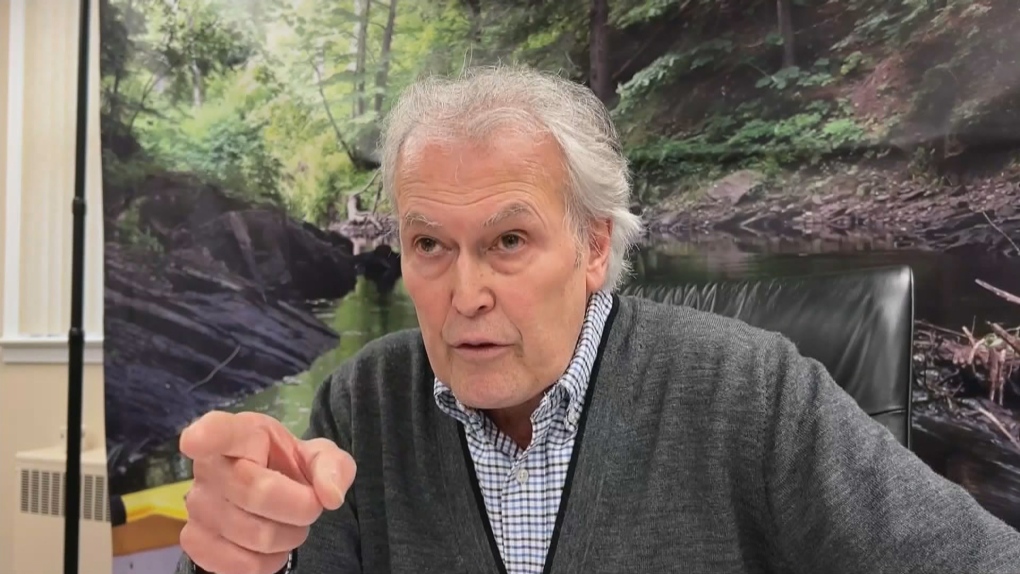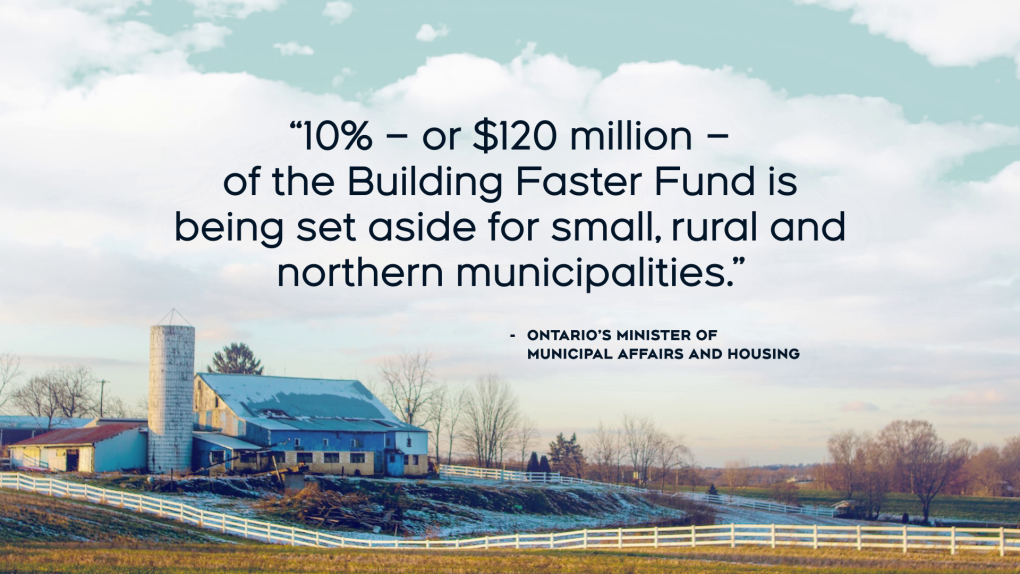'Enough is enough': Rural Ontario mayor accuses feds, province of lacking support on housing
The mayor of Tweed, Ont., along with several mayors and representatives from other surrounding municipalities, believe the provincial and federal government is neglecting them.
An animated Don DeGenova, Tweed's mayor, spoke to CTV News on Monday, saying his community is one of several rural towns who feel the province hasn't invested enough in matters such as infrastructure and housing.
 Don DeGenova, Tweed's mayor, spoke to CTV News on Monday, April 15, 2024.
Don DeGenova, Tweed's mayor, spoke to CTV News on Monday, April 15, 2024.
"As a municipality here in Tweed, we’re 6,100 people," explained DeGenova, the small town mayor of the community about 200 kilometres west of Ottawa.
"We have all of these issues that large, urban centres have. But we don't have the funds to address them."
DeGenova feels the municipality has been shrugged off by the government of Ontario, particularly when it comes to housing.
Last summer, the government expanded its Build Faster Fund, a program built to reward municipalities with additional funding for meeting housing targets.
Tweed was not assigned a housing target. Of the 50 municipalities in Ontario that were assigned a target, only eight have a population under 50,000.
"We don't have the funds nor the skill sets to do this, unlike large, urban centres," DeGenova said.
"Yet we're completely forgotten in the process. All of the municipalities in this area, none of us got any of that money from that fund, other than Belleville."
An alternative option for small municipalities would be the federal government’s Housing Accelerator Fund, which has a separate application for townships with fewer than 10,000 people.
- Sign up now for our daily CTV News Ottawa newsletters
- The information you need to know, sent directly to you: Download the CTV News App
The federal government is offering the funding to accelerate the construction of 100,000 new homes across Canada over the next five years. Cities such as Ottawa are set to receive millions of dollars to help build much-needed housing.
Centre Hastings, a community with a population of just under 5,000 just west of Tweed, applied for the Housing Accelerator Fund, but was denied.
"We were really, really disappointed that we were denied that funding," explained the chief administrative officer (CAO) of Centre Hastings, Typhany Choinard.
"The hundreds of thousands of dollars that are spent on the supporting studies for these applications, and then to feel like you're not even part of that conversation is really, really disappointing."
Back in Tweed, the town is also running into issues trying to revitalise its main street. There are a number of vacant properties that the mayor has worked tirelessly to resolve.
"We have vacant stores on our street that have been vacant for well over six months, in some cases, multiple years. We wanted to introduce a vacancy tax," DeGenova explained.
When the mayor proposed the idea to the province, he was told the provincial government doesn’t like to raise taxes.
"I stood up and said every time you lower your taxes, I have to raise mine," DeGenova continued. "They can look good, they can look great, but then we're the ones that have to take the brunt of it because everything comes back on us."
"Enough is enough because we can't take on any more."
The Ontario Ministry of Municipal Affairs and Housing said in a statement to CTV News that it has taken actions and provided billions of dollars in support to municipalities through several initiatives.
"We have introduced historic investments in municipalities to support housing-enabling infrastructure, including the $1 billion Municipal Housing Infrastructure Program, the $825 million Housing-Enabling Water Systems Fund and the $1.2 billion Building Faster Fund. Ten per cent – or $120 million – of the Building Faster Fund is being set aside for small, rural and northern municipalities," a ministry spokesperson told CTV News in an email.
 Ten per cent – or $120 million – of the Building Faster Fund is being set aside for small, rural and northern municipalities," a ministry spokesperson told CTV News in an email.
Ten per cent – or $120 million – of the Building Faster Fund is being set aside for small, rural and northern municipalities," a ministry spokesperson told CTV News in an email.
"We will continue to work with our municipal partners to ensure that they have the tools and funding needed to support the growth we’re seeing."
The issues Tweed is facing are not new concerns in the province, which has seen its rural population decline.
While Ontario's rural population has remained relatively stable since the 1960's, the proportion on Ontarians living in rural areas compared to the general population has decreased from 37 per cent in 1966 to 17 per cent in 2021.
CTVNews.ca Top Stories

Trudeau considering his options as leader after Freeland quits cabinet, sources say
Chrystia Freeland, Canada's finance minister, said in an explosive letter published Monday morning that she will quit cabinet. Here's what happened on Monday, Dec. 16.
'We're not united': Liberal caucus meets, as PM Trudeau faces fresh calls to resign in light of Freeland's departure
The federal Liberals called an emergency caucus meeting Monday night, as Prime Minister Justin Trudeau faced renewed calls from some members of his party to resign. As MPs emerged, the message was mixed.
'Eventful day,' Trudeau says after Chrystia Freeland quits cabinet, LeBlanc tapped to replace her
In a stunning move, Deputy Prime Minister and Finance Minister Chrystia Freeland announced her resignation from Justin Trudeau's cabinet on Monday, after the prime minister told her he no longer wanted her in the top economic post. After hours of turmoil, Dominic LeBlanc, was sworn-in as her replacement in the finance portfolio.
Feds deliver fall economic statement with $61.9B deficit for 2023-24, amid political turmoil
Amid the news that Chrystia Freeland has resigned from her cabinet position as finance minister, the Department of Finance on Monday unveiled the long-anticipated fall economic statement, which reports a deficit of $61.9-billion for 2023-24.
W5 Investigates Connecting the dots on a landlord scam: how clues revealed a prolific con artist at work
In part one of a three-part investigation, W5 correspondent Jon Woodward reveals how a convicted con artist bilked dozens of people in a landlord scam.
Judge rules Trump does not have presidential immunity protections in hush money conviction
Donald Trump's felony conviction in the New York hush money case should not be tossed out because of the Supreme Court's ruling on presidential immunity.
Canadian hero Terry Fox being featured on next $5 bill
The federal government is paying tribute to Canadian hero Terry Fox by featuring him on the next $5 bank note, officials revealed Monday.
Wisconsin school shooter who killed teacher, student was 17-year-old girl, police say
A teenage student opened fire with a handgun Monday at a Christian school in Wisconsin, killing a teacher and another teenager during the final week before Christmas break. The shooter also died, police said.
Travel risk: Which countries does Canada recommend avoiding?
Canadians planning to travel abroad over the holidays should take precautionary steps to ensure they're not unintentionally putting themselves in harm's way.































